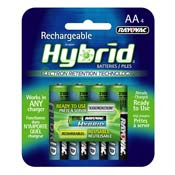 1.2V rechargeable batteries can replace 1.5V alkaline batteries in most applications, but they don't work in some electronics, like radios and remote controls. So, why don't they boost the voltage to 1.5V?
1.2V rechargeable batteries can replace 1.5V alkaline batteries in most applications, but they don't work in some electronics, like radios and remote controls. So, why don't they boost the voltage to 1.5V?The voltage is based upon the chemistry of the battery. The base unit of a battery is called a cell. A single cell will have what is called a nominal voltage based upon what chemicals are used to make up the battery. For example, a standard car battery has 6-cells that each has a nominal voltage of 2-volts per cells (6 cells X 2-Volt = a 12-volt car battery). The “chemistry” of a car battery, in general terms, is lead plates immersed in acid. All lead-acid batteries will be comprised of 2-volt cells. For alkaline, the chemistry is generally a magnesium dioxide mix, which has a nominal voltage will be 1.5V per cell. Rechargeable chemistry types like Nickel Metal Hydride (NiMH) and Nickel Cadmium (NiCd) have a nominal voltage of 1.2V per cell (even though some people list it as 1.25). The chemical reactions inside the cell will determine the output voltage. Unfortunately, you can’t get more out of the chemicals than to boost the voltage.
